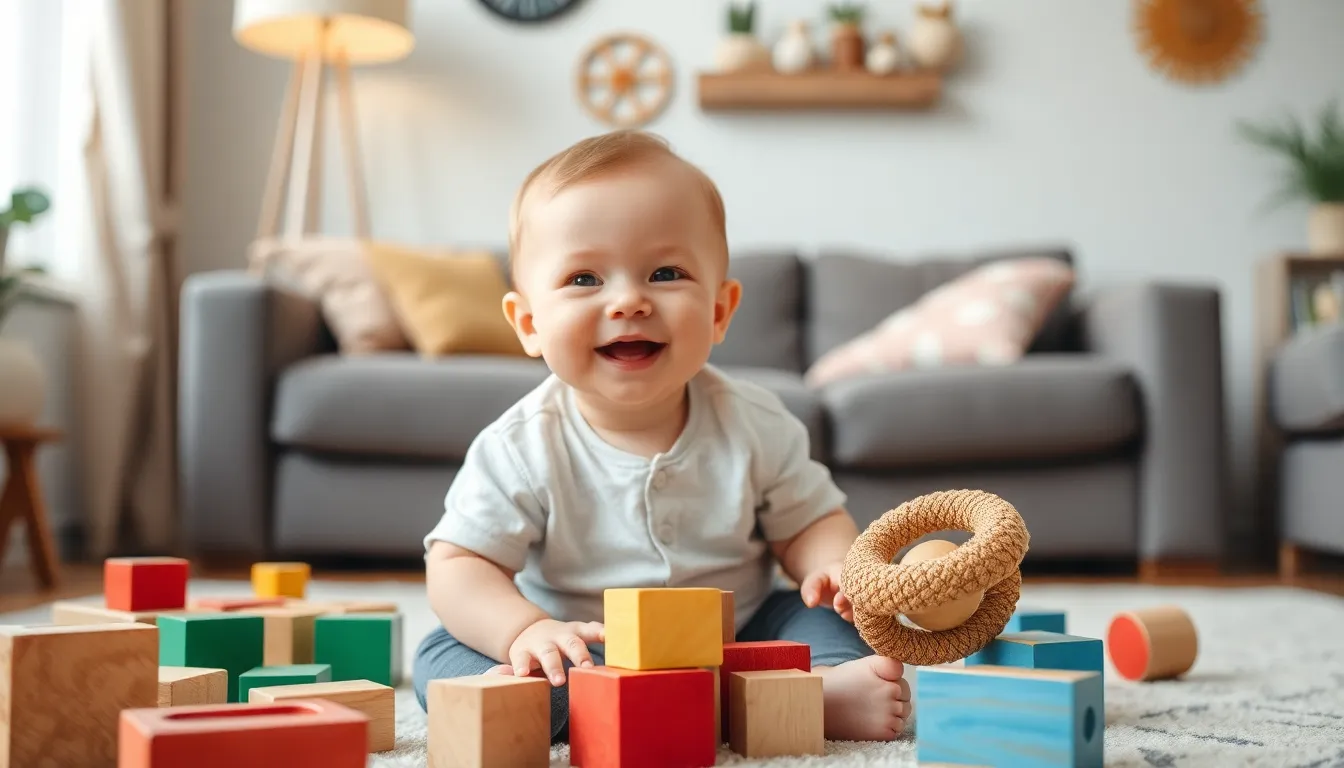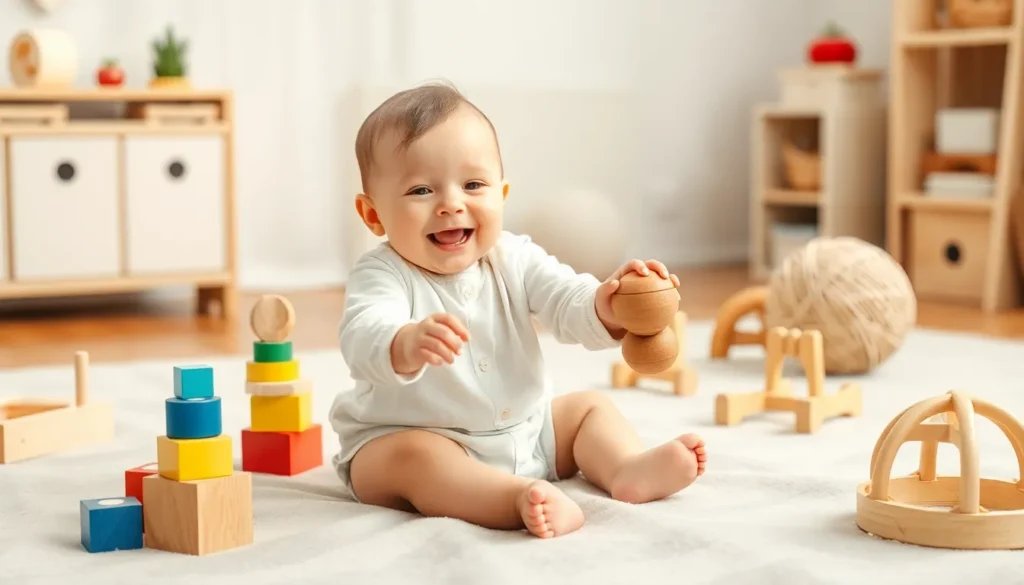Table of Contents
ToggleIn a world where toys often come with more bells and whistles than a circus, Montessori toys for babies stand out like a calm oasis in a chaotic desert. Designed to spark curiosity and encourage independent play, these toys don’t just entertain; they educate. Imagine a toy that not only keeps your little one busy but also helps develop critical skills. Sounds like a parenting dream, right?
What Are Montessori Toys for Babies?
Montessori toys for babies emphasize simplicity and functionality. These toys support hands-on learning and cater to a child’s natural developmental stages. Designed with open-ended play in mind, they allow babies to explore and experiment freely.
Key characteristics include natural materials like wood and cotton. These materials enhance sensory experiences and durability. Unlike synthetic toys, Montessori options often lack bright colors or loud noises, encouraging focused engagement instead.
Categories of Montessori toys encompass a variety of play types. Shape sorters, stacking blocks, and sensory balls promote fine motor skills. Rattles and musical instruments introduce sound exploration and auditory awareness.
Research shows that active participation in play cultivates independence. Independent play fosters problem-solving capabilities and boosts confidence. Montessori toys challenge babies without overwhelming them, ensuring a balanced approach to learning.
Parents can find Montessori toys in various forms, providing something for every age. Toys designed for infants often focus on grasping and visual tracking. Advanced options for older babies might include manipulatives that encourage more complex interactions.
Specific guidelines exist for selecting Montessori toys. Choosing those that align with individual developmental milestones ensures meaningful engagement. Prioritizing safety and durability, always look for high-quality materials to withstand exploration.
Montessori toys for babies are more than just playthings. They serve as essential tools that nurture curiosity, creativity, and cognitive growth. An intentional selection can lay the foundation for a lifetime of love for learning.
Benefits of Montessori Toys for Babies

Montessori toys offer numerous benefits that support a baby’s growth and development. They encourage exploration and learning through engaging, purposeful play.
Promotes Independence
Independence thrives when babies play with Montessori toys. Simple designs allow babies to manipulate the toys without adult intervention. This self-directed exploration builds confidence as they discover new skills. Parents notice that children demonstrate enhanced decision-making while playing. Activities like stacking blocks or sorting shapes foster autonomy, allowing babies to solve challenges at their own pace. Gradually, they learn to trust their abilities, setting a strong foundation for lifelong learning and self-reliance.
Enhances Sensory Development
Sensory development significantly improves with Montessori toys. Designed from natural materials, these toys offer varied textures, weights, and sounds, stimulating a baby’s senses. For example, wooden blocks provide tactile feedback that Hones fine motor skills. Through shaking rattles or rolling balls, infants experience cause and effect, enhancing their understanding of the world. Engaging with these toys also encourages visual tracking as babies focus on movement. Ultimately, sensory-rich experiences integrate seamlessly into play, promoting cognitive growth while nurturing curiosity.
Types of Montessori Toys
Montessori toys come in various types, each designed to support a baby’s developmental journey. They encourage exploration, creativity, and essential skill-building.
Wooden Toys
Wooden toys are fundamental in Montessori education. They promote durability and safety while also being environmentally friendly. Classic examples include stacking rings and shape sorters, which stimulate fine motor skills. Babies benefit from the tactile experience of wooden textures, enhancing sensory awareness. These toys often feature natural finishes, free from harmful chemicals, ensuring safety during play.
Sensory Toys
Sensory toys are integral to cognitive and physical development. They engage multiple senses, providing varied textures, colors, and sounds that stimulate curiosity. Examples include textured balls, sensory boards, and soft fabric books. Babies explore different materials, which enriches their sensory experiences. Engaging with sensory toys supports hand-eye coordination and encourages independent exploration during playtime.
Role-Play Toys
Role-play toys motivate imaginative play and creativity. They often include figures, puppets, and simple costumes that allow babies to explore social interactions. Engaging in role-play builds communication skills as babies mimic behaviors and emotions. These toys also enhance cognitive development through storytelling and problem-solving scenarios. Families can choose toys that reflect diverse cultures, introducing babies to various social contexts early on.
Choosing the Right Montessori Toys
Selecting suitable Montessori toys involves understanding developmental milestones and specific needs of babies. Choosing toys that align with a child’s age fosters learning and enhances engagement.
Age Appropriateness
Age-appropriate toys support a baby’s growth and development effectively. For infants aged 0-6 months, grasping toys encourage tactile exploration, while visual toys assist in tracking movements. Babies aged 6-12 months benefit from stacking toys that develop fine motor skills and problem-solving abilities. Appropriate toys not only entertain but also challenge babies to master new skills, promoting independent play. Parents can find a variety of options specifically designed for each developmental stage, ensuring alignment with their child’s evolving needs.
Safety Considerations
Safety plays a crucial role in selecting Montessori toys. Non-toxic materials such as wood and organic cotton are ideal choices, minimizing exposure to harmful substances. Additionally, ensuring toys are free from small parts prevents choking hazards. Parents should examine toys for rough edges or splinters, as these can pose risks during playtime. Prioritizing safety promotes a worry-free exploration environment. Regularly inspecting toys for wear and tear helps maintain a child’s safety and enjoyment while playing.
Montessori toys are more than just playthings; they’re essential tools for nurturing a child’s development. By encouraging independent exploration and hands-on learning, these toys help babies build foundational skills that will benefit them throughout their lives. The focus on simplicity and natural materials ensures that playtime is both safe and enriching.
Selecting the right Montessori toys tailored to a baby’s developmental stage can significantly enhance their sensory experiences and cognitive growth. With a variety of options available, parents can easily find toys that align with their child’s unique needs. Embracing Montessori principles in playtime can pave the way for a lifelong love of learning and discovery.







